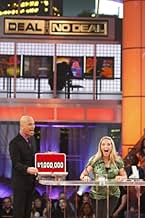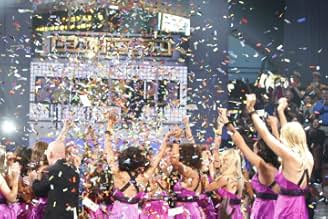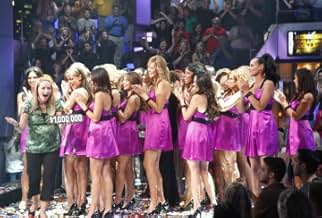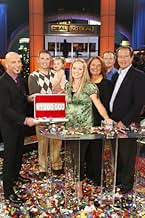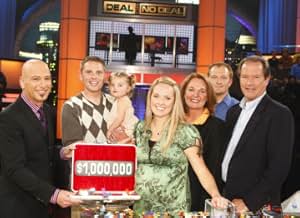AVALIAÇÃO DA IMDb
5,1/10
4,4 mil
SUA AVALIAÇÃO
Adicionar um enredo no seu idiomaContestants face 26 sums of money, 26 suitcases, and one question: Deal or no deal?Contestants face 26 sums of money, 26 suitcases, and one question: Deal or no deal?Contestants face 26 sums of money, 26 suitcases, and one question: Deal or no deal?
- Indicado para 1 Primetime Emmy
- 2 vitórias e 9 indicações no total
Explorar episódios
Enredo
Você sabia?
- CuriosidadesOn the 1 September 2008 episode, Jessica Robinson became the first contestant ever to win the $1,000,000. She turned down an offer of $561,000. The only remaining value left was $200,000. (Season 4, Week 2.)
- ConexõesFeatured in Screenwipe: Episode #1.2 (2006)
Avaliação em destaque
First off,I don't want to sound like some buzz-kill here in regards to this show,or sound like I'm taking this show too seriously. Basically,when and if I watch this,besides the possibility that there's not much else on,I watch this primarily because I'm a student of human nature,and I do find it interesting what--when it comes to money--is any given individual's "breaking point" is. Sometimes I put myself in the place of the contestant,where I would or wouldn't deal. Sometimes I put myself in the role of Howie(and he does a very good job as the host,one part friend,one part Devil's advocate,lighter on the advocate). I even occasionally put myself in the role of one of the Oh-so-Gorgeous models(don't ask)! Much of the time,though,I'm usually just watching to guess what the Banker would do,figuring how much he would offer according to which cases have been opened.
The falsehoods I'm referring to--and thusly,why I feel like this show is equally,if not more so,head-banging and frustrating in nature--are some very important little notions and precipices that this show so famously stands atop. I've narrowed down the offenders to three biggies:
1. Each contestant is playing for a Million Dollars. While in principle,this is a correct assertion,more realistically and literally,the contestants are more playing to see how much they can make off the BAnker's offers. At it's heart,this show is adversarial,and few contestants leave with what's in the case they select(and usually,when they do,it's WAY less than they wanted).
2. That the case boards are easy to read. For example,just because someone eliminates a fair cluster of small amounts,particularly early,means that the board IS a player's board. By contrast,just because a number of large amounts are off the board at the start,DOESN'T mean the board cannot be favorable. In other words,in a game of probabilities,just because the high odds might favor the player ISN'T in and of itself a good tell of whether or not a player should deal.
3. After the deal has been made(and often it is),the host will ask the contestant what he or she would've taken if they'd gone on. Ponder that for just a second. Unless the contestant in question had a map plan of which cases they would've taken and when,this is a HUGELY false device,meant to instill a sort of "What if...?" twist to the end-game that is neither truthful or necessary.
There are more minor examples of these:magical thinking devices that are to somehow fool the contestant(And by proxy,the audience)into thinking that this is(or is supposed to be)ruled by something other than happenstance or luck;the assumption that the contestants are all somehow "average" people,when it seems like there is a definite type of people who are selected(usually,that connotes a person who possesses a lot of enthusiasm,good luck charms,loud, resolute family members and friends and stays pretty light on such meaningless stuff as intelligence,particularly in math,pretty SUB-average IMHO). I guess what I'm trying to say,in sum,is that this show is a perfectly okay wasting of an hour's TV time,but you might want to keep in mind that this is as much(if not more so)sideshow and theatrics as it is any sort of chance for people to get rich. Do that,and the viewing of DoND will go down a lot easier,particularly if you are not their type of contestant material.
The falsehoods I'm referring to--and thusly,why I feel like this show is equally,if not more so,head-banging and frustrating in nature--are some very important little notions and precipices that this show so famously stands atop. I've narrowed down the offenders to three biggies:
1. Each contestant is playing for a Million Dollars. While in principle,this is a correct assertion,more realistically and literally,the contestants are more playing to see how much they can make off the BAnker's offers. At it's heart,this show is adversarial,and few contestants leave with what's in the case they select(and usually,when they do,it's WAY less than they wanted).
2. That the case boards are easy to read. For example,just because someone eliminates a fair cluster of small amounts,particularly early,means that the board IS a player's board. By contrast,just because a number of large amounts are off the board at the start,DOESN'T mean the board cannot be favorable. In other words,in a game of probabilities,just because the high odds might favor the player ISN'T in and of itself a good tell of whether or not a player should deal.
3. After the deal has been made(and often it is),the host will ask the contestant what he or she would've taken if they'd gone on. Ponder that for just a second. Unless the contestant in question had a map plan of which cases they would've taken and when,this is a HUGELY false device,meant to instill a sort of "What if...?" twist to the end-game that is neither truthful or necessary.
There are more minor examples of these:magical thinking devices that are to somehow fool the contestant(And by proxy,the audience)into thinking that this is(or is supposed to be)ruled by something other than happenstance or luck;the assumption that the contestants are all somehow "average" people,when it seems like there is a definite type of people who are selected(usually,that connotes a person who possesses a lot of enthusiasm,good luck charms,loud, resolute family members and friends and stays pretty light on such meaningless stuff as intelligence,particularly in math,pretty SUB-average IMHO). I guess what I'm trying to say,in sum,is that this show is a perfectly okay wasting of an hour's TV time,but you might want to keep in mind that this is as much(if not more so)sideshow and theatrics as it is any sort of chance for people to get rich. Do that,and the viewing of DoND will go down a lot easier,particularly if you are not their type of contestant material.
- KUAlum26
- 14 de fev. de 2008
- Link permanente
Principais escolhas
Faça login para avaliar e ver a lista de recomendações personalizadas
- How many seasons does Deal or No Deal have?Fornecido pela Alexa
Detalhes
- Data de lançamento
- País de origem
- Idioma
- Também conhecido como
- Deal or No Deal UK
- Locações de filme
- Empresas de produção
- Consulte mais créditos da empresa na IMDbPro
Contribua para esta página
Sugerir uma alteração ou adicionar conteúdo ausente





